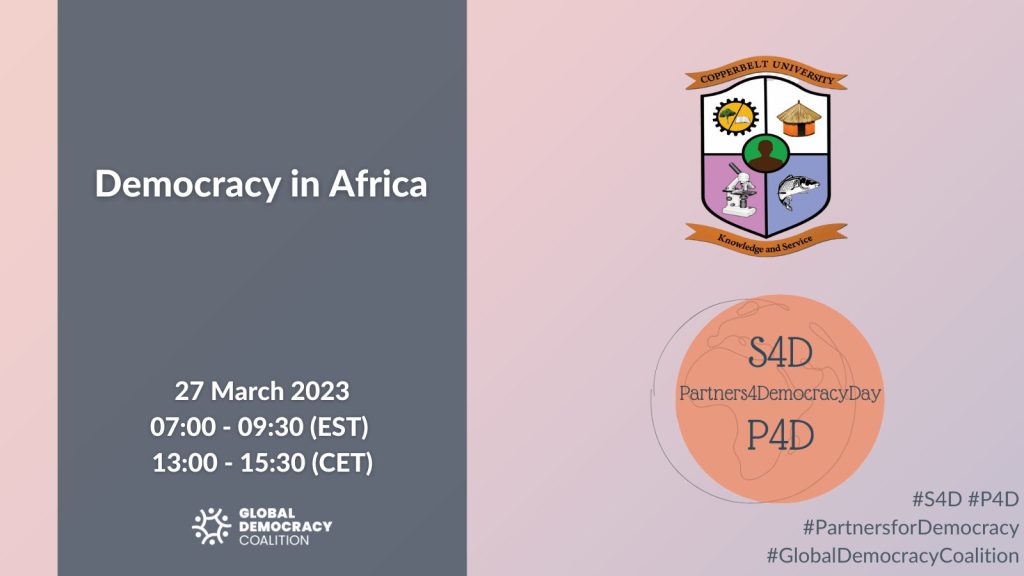
Democracy in Africa
A wave of democratization has been sweeping across Africa as a governance model. However, the statistics regarding the continent’s Unconstitutional Changes of Government (UCG) as a constant threat to the democratic agenda make for less than uplifting reading. According to AU-ECOSOCC, since the 1960s, when the majority of the countries in Africa gained independence, there have been about 200 military coups. In addition, where we are not dealing with the UCG phenomenon, we are constantly confronted with counterproductive political and electoral violence across the continent, even within those African States which are generally regarded as commendably “successful” democracies.
The foregoing is a constant reminder that the democratization process is far from complete on the continent. For that reason, perhaps we draw one (1) fundamental lesson we should have learnt by now. The very model of democracy, which appears to be imported from other places, seems NOT to be as functional as we would wish. Instead, in some cases, the current democratic electoral model tends to be conflict-generating rather than peace-promoting and development-enhancing in its overall effects.
Perhaps no one African theorist can claim to have all the answers to this fundamental and vexing question, but whatever model(s) of democracy Africa creates for herself must at least take cognizance of what Article 35 of the African Charter on Democracy, Elections and Governance (ACDEG) implies. That is, traditional leadership must be incorporated into the whole democratic governance structure as well.
There is also a need for a Pan-African agenda where focused and coordinated meetings are held with regards to the contextual Democratic model(s) for Africa. The Dag Hammarskjöld Institute for Peace and Conflict Studies stands ready to do its part in this effort, and sought to explore this topic further during this event for Partners for Democracy Day.
PANELISTS:
- Rosemary Chilufya (PhD) teaches and undertakes research in the Dag Hammarskjöld Institute for Peace and Conflict Studies (DHIPS), of the Copperbelt University. Courses taught include Democratisation Processes and Conflict Transformation. Her research interests include: democratisation processes, conflict analysis and conflict prevention. Dr. Chilufya has published in election administration assessment. She is a graduate of the University of Zambia, University for Peace, and University of Huddersfield.
- John Bwalya (PhD) is a Professor at the Dag Hammarskjöld Institute for Peace and Conflict Studies of the Copperbelt University, Zambia. He is a graduate of the University of Zambia, the University of London and the University of Fort Hare. He is a qualified Mediator (London School of Mediation) and a Qualified Member of the International Mediation Institute (IMI). He researches electoral politics, social movements and urban studies, with recent publications on democracy, party politics and ethnic mobilisation, horizontal inequality, and electoral conflict. He has taught at several universities in Southern Africa.
- Gosnell L. Yorke (PhD) was born in the English-speaking Caribbean Nation of St. Kitts-Nevis for which he once served as Honorary Consul (Diplomat) to South Africa (2003-2013). He holds a PhD in Religious Studies from McGill University, Canada (1987), specializing in the study of the socio-political and other roles of the Church in relation to society. In addition, he spent two years full-time at the McGill University Law School (1986-1988) where he took courses in both English Common Law and French Civil Law, including Human Rights Law. In addition to speaking French, Portuguese and Spanish, he holds a Post-Doctoral Certificate in Linguistics from the University of South Africa (UNISA). As a Pan-Africanist who has published in the areas of Religious Studies and language use in Africa, the human rights of minorities (especially of African descent) and postcolonialism, he has also served as an Extraordinary Professor in the Institute for African Renaissance Studies at UNISA (2014-2017). Since 2015, he has been lecturing in the Dag Hammarskjöld Institute of Peace and Conflict Studies (DHIPS) at the Copperbelt University, Zambia. Some of the courses in which he has either lectured or is currently lecturing deal with religion, democracy and human rights. He is also serving as the Focal Person of DHIPS to the Economic, Social and Cultural Council (ECOSOCC) of the Africa Union.
- Hyden Munene (PhD) is a Research Fellow in the Dag Hammarskjöld Institute for Peace and Conflict Studies (DHIPS) of the Copperbelt University (CBU). He teaches and undertakes research in DHIPS. He teaches governance, peacebuilding, nation and state building. His research interests include: election administration and management. He has published in election administration and management. Dr. Munene is an MPCS graduate of DHIPS at CBU. He studied his PhD and undertook Post-Doctoral Fellowship at Free State University.
:
MODERATOR:
- Dr. Robby Kapesa (PhD) is a Research Fellow in the Dag Hammarskjöld Institute for Peace and Conflict Studies (DHIPS) of the Copperbelt University (CBU). He teaches and undertakes research in DHIPS. He teaches Environment, Sustainable Development and Peace. His research interests include: electoral politics and elections, inequalities, climate change and mining. He has published in political mobilisation, political violence, party politics, ethnic mobilisation, horizontal inequality, and electoral conflict and ethnicity. Dr. Kapesa is an MPCS graduate of DHIPS at CBU. He studied his PhD in PCS at CBU and did his Post-Doctoral Fellowship in the Department of Political Science and International Relations, at University of Geneva, in Switzerland. He was a visiting researcher at the Tata Institute of Social Sciences, Mumbai, India, and the American University in Cairo, Egypt.
.
TIME KEEPING AND HOSTING:
- Mr. Kondwani Kapinga (MSc) is a Research Fellow in the Dag Hammarskjöld Institute for Peace and Conflict Studies (DHIPS) of the Copperbelt University (CBU). He teaches and undertakes research in DHIPS. He teaches Environment, Sustainable Development and Peace. His research interests include: climate change, carbon stock modelling, environmental impact assessments, ecological assessments and rural development. He has published in environmental management and biomass modelling. Mr. Kapinga is an MSc graduate of School of Natural Resources at CBU and is also specialised in remote sensing and geographical information systems.
